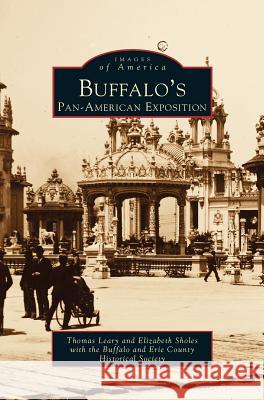Buffalo's Pan-American Exposition » książka
Buffalo's Pan-American Exposition
ISBN-13: 9781531637149 / Angielski / Twarda / 1998 / 130 str.
One of a series of popular turn-of-the-century international expositions, the Pan-American Exposition of 1901 emphasized Western Hemisphere production and trade. The Pan-Am flaunted America's status as a leading international power after the victory from the 1898 Spanish-American War. In this engaging pictorial history, discover the relationship between the exposition and its host city of Buffalo, and the triumphs and tragedies it endured. Discover the booming Buffalo of 1900, with its links to midwestern agriculture and eastern markets. The city had abundant electric power, was home to several important industries, and had a wealthy and influential leadership. A logical venue for the exposition, Buffalo became home to a fair that paid tribute to the nation's industrial, agricultural, and commercial dominance. Along with Chicago in 1893 and other fairs that followed, the Pan-Am combined high-toned self-promotion in the formal exhibits with midway displays that made sport of other cultures and races. The exposition came to a shattering close with the assassination of Pres. William McKinley on its grounds in September. Neither the fair nor the city fully recovered. Buffalo's Pan-American Exposition explores a unique time in American history. Historians, scholars, and residents alike will delight in this fascinating collection of images from Buffalo and Erie County
Historical Society.
One of a series of popular turn-of-the-century international expositions, the Pan-American Exposition of 1901 emphasized Western Hemisphere production and trade. The Pan-Am flaunted Americas status as a leading international power after the victory from the 1898 Spanish-American War. In this engaging pictorial history, discover the relationship between the exposition and its host city of Buffalo, and the triumphs and tragedies it endured. Discover the booming Buffalo of 1900, with its links to midwestern agriculture and eastern markets. The city had abundant electric power, was home to several important industries, and had a wealthy and influential leadership. A logical venue for the exposition, Buffalo became home to a fair that paid tribute to the nations industrial, agricultural, and commercial dominance. Along with Chicago in 1893 and other fairs that followed, the Pan-Am combined high-toned self-promotion in the formal exhibits with midway displays that made sport of other cultures and races. The exposition came to a shattering close with the assassination of Pres. William McKinley on its grounds in September. Neither the fair nor the city fully recovered. Buffalos Pan-American Exposition explores a unique time in American history. Historians, scholars, and residents alike will delight in this fascinating collection of images from Buffalo and Erie County
Historical Society.











